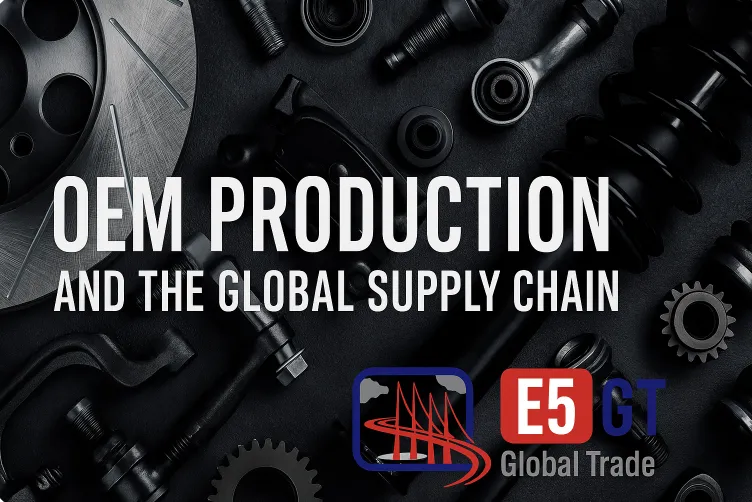OEM Manufacturing and the Global Supply Chain in Automotive Aftermarket Parts The automotive sector is one of today's most complex and integrated industries with global production networks. A vehicle comprises hundreds of parts, and most of these parts come through a global supply chain rather than centralized production. When we talk about automotive aftermarket parts, we're not talking about just one product; we're talking about a system encompassing engineering, quality control, technology, and continuity. OEM manufacturing (Original Equipment Manufacturing) is playing an increasingly larger role in this system. Brands are increasingly choosing to collaborate with specialized manufacturers rather than producing everything in their own factories. Turkey has gained a significant position in this field, particularly in the last decade. Facilities concentrated in Bursa, Kocaeli, İzmit, Adapazarı, and some districts of Istanbul, known as automotive industrial zones, manufacture a wide range of products, including brake pads, axle suspension systems, headlight engine parts, electronic control units, and interior accessories. These manufacturers export not only to the local market but also to markets in Europe, North Africa, the Middle East, and even North America. In OEM production, the manufacturer not only produces but also develops products for the customer brand. From design to prototyping, production line establishment, quality control, packaging, and shipping, the company works in integration with the customer throughout the entire process. The certifications held by the manufacturer are crucial in this process. Certifications such as ISO 9001, IATF 16949, ISO 14001, and TS 16346 demonstrate that a manufacturer complies with international standards. IATF 16949, in particular, is a mandatory quality management system for the automotive industry, and companies without this certification cannot enter the supply chain of major brands. Technical capacity alone is not sufficient for a global supply chain. Continuity, rapid response, flexible production, and logistics costs are also major factors. For example, if a German car brand requests 50,000 suspension parts per month from a Bursa-based company, the manufacturer must be able to produce this quantity, deliver on time, and maintain consistent quality across all batches. Any delay or drop in quality can result in the manufacturer being removed from the list. Therefore, successful OEM manufacturers plan their production lines precisely according to customer demand. The production line must be flexible and allow for quick changes in small batches. Furthermore, quality control points must be constantly active during production, records of each product's measurements must be kept, and test reports must be presented to the customer. Digital management of these processes is particularly preferred by major brands. Another important element in the supply chain is the logistics and delivery model. The JIT (Just in Time) system is widely used in the automotive industry. In this system, parts are delivered exactly as they enter the assembly line. This requires manufacturers to maintain strict delivery timelines. Turkey has a significant advantage in this regard because it can reach the European market by land within 2 to 4 days. This timeframe is much shorter and more cost-effective compared to countries like China or India. Furthermore, some manufacturers establish warehouses near customer factories to respond more quickly. These warehouses meet parts demands immediately. e5globaltrade offers consulting services to manufacturers on these types of logistics solutions. It develops joint solutions to questions such as which delivery model is suitable for which region, which carrier is more reliable, and which customs line is faster. Trade fairs remain the most effective method for marketing. Trade fairs like Automechanika in Germany, Solutrans in France, or The Big 5 in Dubai are the best way to connect directly with decision-makers. e5globaltrade manages the entire process for manufacturers to participate in these trade fairs. From booth reservations to brochure design, translation services, appointment scheduling, and post-show follow-up, all processes are handled professionally. The automotive industry is moving towards electric vehicles and autonomous systems in the future. This transformation is also impacting the aftermarket sector. Now, not only mechanical parts but also next-generation products such as electronic control systems, battery cooling units, charging connectors, and sensors are in demand. Turkish manufacturers are strengthening their engineering staff and increasing their R&D investments to transition into this field. Conclusion: OEM manufacturing in automotive aftermarket parts is not just about production; it's a strategic partnership. Success is based on quality, continuity, and trust. Entering the global supply chain isn't easy, but once established, these relationships can last for many years. e5globaltrade is a partner who shows manufacturers that they are not alone on this journey. Because true competition is achieved through integration, not production.
E5 Global Trade | Yazılar
OEM Manufacturing and Global Supply Chain in Automotive Aftermarket Parts


